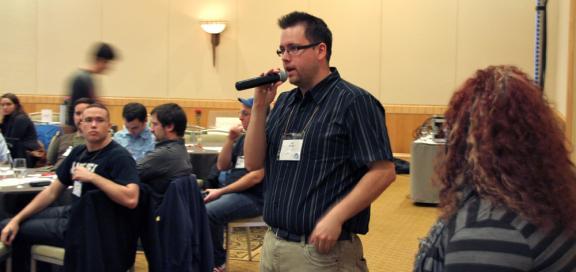On Sunday young workers from MoveUP took part in Our Turn 2011, a free gathering hosted by the BC Federation of Labour to bring together young workers, environmentalists, students, and other progressive activists. Attracting 150 participants, Our Turn ended up being the largest youth conference the BC Federation of Labour has put on.
Emcees Stephen Von Sychowski (MoveUP Executive Councillor) and Jarrah Hodge (MoveUP Communications Rep) welcomed participants to Vancouver and kicked off the conference by welcoming BC Fed President Jim Sinclair. Sinclair remarked on the great turnout of youth who were not members of unions and commented that labour organizations can only grow and thrive if we respect people and work with non-union members to build a movement.
Sinclair noted some of the challenges we face today, mentioning in particular workplace health and safety and the lenient punishment for employers who, through their negligence, injure or kill workers. He shared his frustration around the arguably low fines levied on the owners of the mushroom farm where two workers died and two more were permanently disabled after a gas leak. "[They] should go to jail," he said.
He also spoke about some of the achievements the labour movement has seen, partly as a result of listening to and including young people, including increases in the minimum wage and initial success on safety improvements for late night retail workers through Grant’s Law.
including increases in the minimum wage and initial success on safety improvements for late night retail workers through Grant’s Law.
"This labour movement is built on solidarity," he said, "The working class hasn’t got a thing they didn’t fight for," he said, concluding with a call to participants to pool their time, energy, and commitment to generate new ideas for action on key issues and for the labour movement’s future in general.
After that opening speech, a group of young workers including MoveUP’s Jeff Bryant took to the stage to begin facilitation of a world cafe. World Cafes are a way of encouraging collaborative knowledge production through very loosely guided small group discussion. Participants were encouraged to move to different tables and to talk and draw ideas on very broad topics, including what issues most concerned them, what barriers prevent meaningful change, and what individual and collective action should be taken to make positive change.
On this last item, participants wrote their commitments to change in six words or less on pieces of coloured paper which were mounted to create a wall of actions that everyone could draw inspiration from.
After a break for lunch the conference resumed with a panel discussion including Stephen Von Sychowski, this time representing the Employee Action & Rights Network; BC Chairperson for the Canadian Federation of Students Zachary Crispin; and Alexandra, a representative from the Agricultural Workers Alliance. The panel members each spoke about their own pathways into activism and the work of their organizations. They also suggested ways participants could get involved in their campaigns and in broader types of progressive activism.
After the panel the world cafe resumed as participants were broken into random groups, each assigned a key policy area for discussion. Groups brainstormed the priorities they felt the labour movement should adopt on issue such as childcare, environmental issues, inequality, and First Nations issues.
Next came a presentation on social media from Jamie Biggar of the independent advocacy organization Leadnow.ca. Realizing most of the people in the room knew the technical side of social media, Biggar focused on the next step: using social media as a tool to tell our stories as a labour/progressive movement. After taking participants through an exercise to turn your issues into compelling, relatable, accessible stories, he encouraged unions and organizations to make sure they were using social media to engage, not just announce.
"Don’t ask for feedback and then ignore it," he said, "To be interesting you also have to be interested."
To conclude the day, Our Turn welcomed a panel of three Occupy Vancouver organizers. The panel acknowledged there had been mistakes and that the movement is now in a transition as they move away from having an encampment, but also took time to correct what they felt had been unfair media generalizations about why they were there and what was going on at Occupy Vancouver.
One panelist said that every morning he called the government hotline to see if there were beds for the 30 homeless people who were camping with them, but that with the exception of one day, there were no available beds to be found in Vancouver. However, he also pointed out he felt the media focus on the homeless residents ignored the vast numbers of people who turned out to Occupy Vancouver but didn’t always sleep there, most of whom were employed.
While they differed in the degree to which they are still involved in the movement, the group generally felt optimistic about the future of Occupy. One organizer said she got involved because it was the first real time she’d seen an opportunity to address root causes of inequality, not just symptomatic issues. They encouraged anyone who was interested in getting involved to develop ideas and bring them to a General Assembly.
To finish, the young workers were invited to a social/fundraiser for the BC Fed Youth Committee at the Railway Club to continue discussing what they’d learned during the day.




